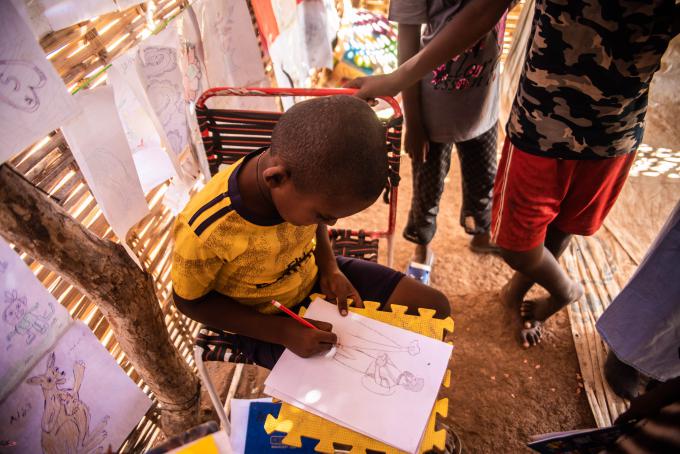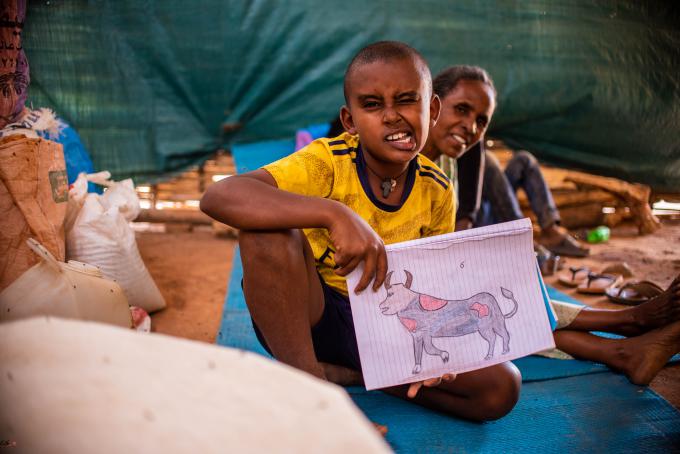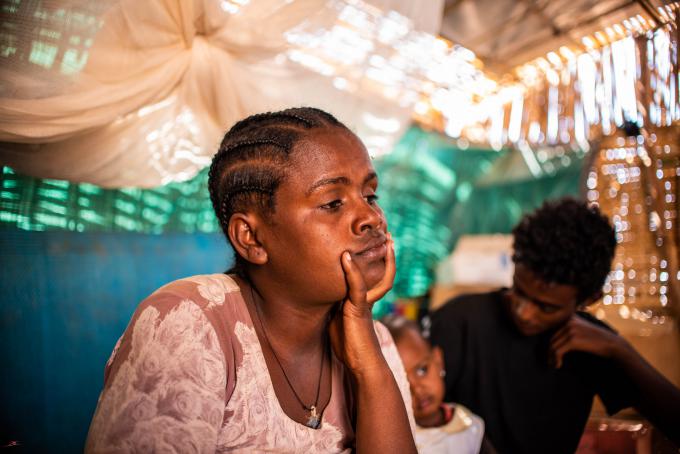Save the Children's Ethiopian Refugee Response in Um Rakoba Camp, Gedaref
There is a growing humanitarian complex crisis emerging across Sudan, not just on the border with Ethiopia. Across the whole of Sudan, the number of people in need of humanitarian assistance is 12.7 million, over one quarter of the total population. The crisis encompasses conflict displacement, flooding, disease outbreak and food insecurity. Sudan has long suffered from overstretched and fragile public services, and the recent multiple shocks have pushed their capacity to the limit.
On 9 November 2020, a new wave of refugee influx started to Eastern Sudan from neighbouring Ethiopia; 45% of the new arrivals were children. There are now nearly 62,000 new arrivals from Ethiopia in Sudan.
All the new Ethiopian refugees are in need of humanitarian assistance including shelter, food items, non-food items, WASH services and protection. Significant service gaps remain in the refugee camps, and there are significant protection challenges with vulnerable people not knowing how to access basic services and not receiving specialised support, high number of unaccompanied and separated children, sexual and gender-based violence incidents, other negative coping mechanisms, and the risk of trafficking.

Zelalem*, 12, came to Um Rakoba camp with his brother and sister, his mother, and his grandmother. He now attends a Child-Friendly Space in the camp.
Zelalem’s story on his own words:
I come to this child-friendly space day after day, where in the day I stay at home I help my mother bring water from the water bladder to prepare us food. I don’t have many things to do during the day when I stay at our new home, so I enjoy drawing for my mum and grandmother at home. They love my drawings.
On the day I go to the [Save the Children] Child-friendly Space, I am extremely happy and enthusiastic as I start my day early at 7 am to spend as much time as possible there. We have to go back home at 11 am to take a break and eat and come back to play at 3 pm. I spend the extra 2 hours playing football with my friends. I come home tired after having a good time there. I tell my mother and grandmother what I did during the day and what I painted.
What makes me happier is that I spend time with my friends and I do a lot of painting, I love painting, and I feel proud when my drawings are hanged for display in our space. I trace and color cartoon characters as well as animals.
When I'm alone, and sometimes before bed, I remember the long journey that my family and I took to come here. We have rent a car to come to the border of Sudan, and we had to cross the river. My mother and my little sister took the boat with my grandmother to cross to the other side, while my elder brother and I had to cross the river swimming. We crossed the river swimming in about half an hour with other children. When we arrived at the border, the place was crowded, we had to sleep on the floor, we were hungry and there was not much to eat. Here at the camp, we are in a better place where we have food and shelter.

Zelalem*, 12, with his grandmother at their tent in Um Rakoba Camp.
Back home, I used to go to school. My father who is a science teacher always encourages me to study and memories my lessons, now because of the war, he is away, I miss him and I look forward to seeing him soon.
I do miss my home- our big house and my room back home. I had many toys. I used to print drawings from the internet and color them like what I do now in the child-friendly space. Back home in Ethiopia, we had a studio – named after me. My mum used to work every morning in the studio, while my dad works in the evening and sometimes I join him after I finish my homework with my mother. I used to enjoy the photoshoots of brides and grooms the most. I wish if we can have our home and our life back.

Aida, Zelalem's mother with her children at her tent in Um Rakoba Camp.
Zelalem’s mother says:
We had to flee our home when the war started in the Tigray region to protect our children, and settle in a peaceful place. I was in the house with my kids and my mother when we first heard the sounds of the attacks in the afternoon. We knew that there are tensions in the country, but we wouldn’t expect it to escalate so quickly. We were not ready for that.
I called my husband and he confirmed to me that the war has started. He told me to leave immediately with the kids. We had to escape and leave our house... our beautiful house and everything behind us.
The journey started when we rented a car to drop us at the border with Sudan, where we had to take a boat to the other side. On the road we saw awful things, people were screaming and running, and others in clothes stained with blood. I put my hand on the eyes of my little girl Hannah*, and asked my children Zelalem and Abel* to put their heads between their legs so that they would not see those scenes. I didn’t want their memory to retain that much pain.
When I was in my hometown, days were busy. I used to work at our studio in the morning and come back in the afternoon to be there for my children and my husband when they come back from school and work to have our meal together. Now I don't have much to do, I prepare food and try to keep my kids busy with useful things as they don’t go to school anymore. My big concern is to get them back to regular education. Nevertheless, I'm happy to have a child-friendly space that enables my kids to have a good time during the day.
Zelalem is attending a Save the Children Child-Friendly Space (CFS) in Um Rakuba camp. Save the Children is active in Um Rakuba Camp since mid-November with a Child Protection and Education (ECCD) response. Save the Children has one active CFS with animators from the refugee community, and social workers from the State Council of Child Welfare (SCCW) and undertaking PSS activities.
In Gedaref State, Save the Children is active in Um Rakuba Camp since mid-November with a Child Protection and Education (ECCD) response. Save the Children has one active CFS with animators from the refugee community, and social workers from the State Council of Child Welfare (SCCW) and undertaking PSS activities. One Community Based Child Protection Network has been formed. Save the Children has been working closely with SCCW in the provision of interim care for UASCs. Save the Children is currently constructing multiple ECCD centres, and has trained refugee teachers to support 4 to 6 year olds. In Tenaydbah, Save the Children has initiated a Child Protection and ECCD response, and the first CFS is operational.
 Sudan
Sudan